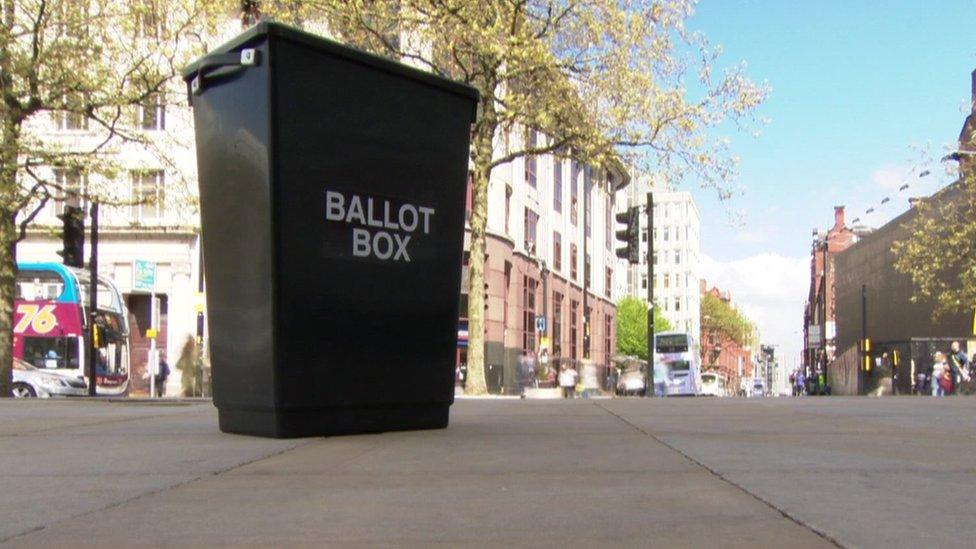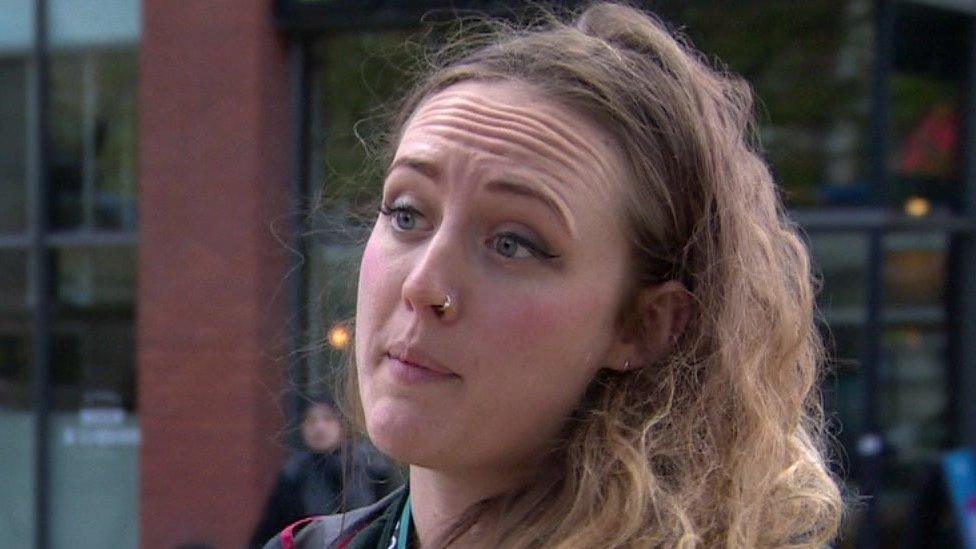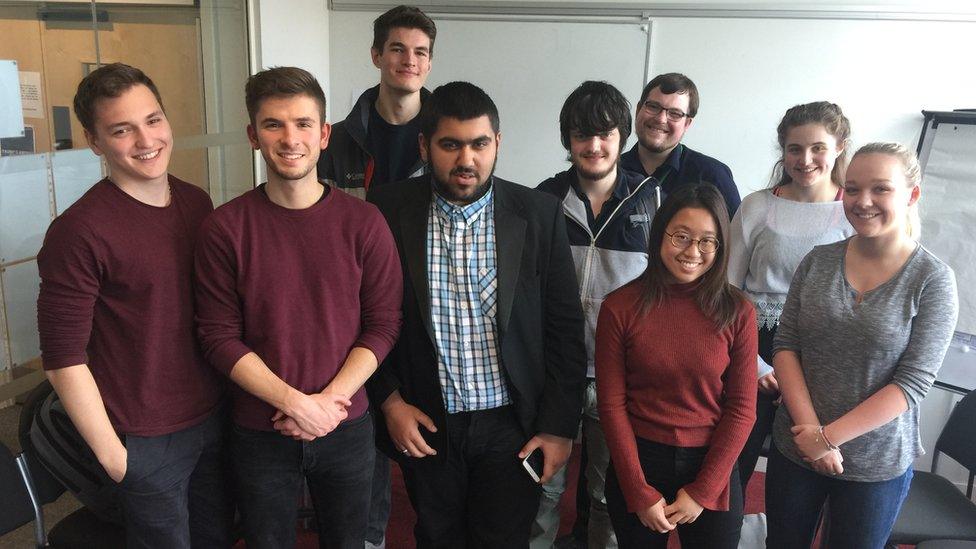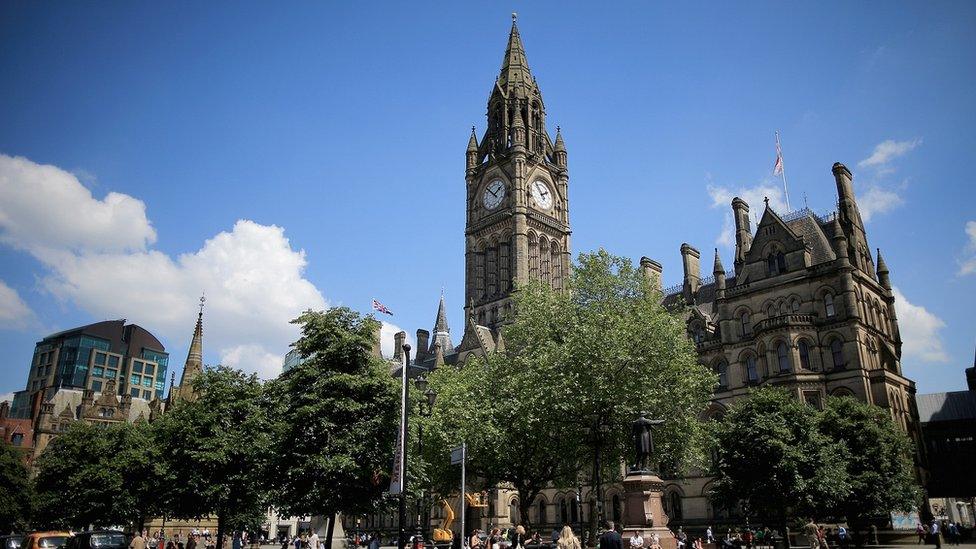Election 2017: Will the decline in younger voter turnout continue?
- Published
Dean Wilson, 24, says he won't be voting
As well as the general election on 8 June, in six parts of England you'll also have the chance to choose a mayor for your region on 4 May.
Opinion polls suggest younger people are less likely to vote than ever before. So we've hit the streets to find out whether they will choose to exercise their democratic right.
"It doesn't interest me"... "I don't like elections"... "I haven't followed it very well".
They were just some of the reasons given to us in Manchester city centre by people aged under 30 for not planning to vote.
While nobody can pretend this snapshot of opinion is scientifically accurate, it does seem to follow the prevailing trend.
In the 2015 general election, for example, turnout for people aged 18-24 was 43%.
Amongst the population as a whole, two out of every three voted, said polling company Ipsos MORI.
Back in 1992, when John Major beat Neil Kinnock, about as many (63%) of 18 to 24-year-olds voted.

People in Manchester city centre were asked their views about whether they will vote in the mayoral election next month
Greater Manchester's first mayor will soon have not inconsiderable powers over transport, housing, skills and apprenticeships, planning, police and the fire and rescue service.
Even so, some people we spoke to still think voting is "pointless".
"I won't be because I believe the government is hard on youngsters. I don't like elections," says Dean Wilson, 24, from Withington in south Manchester.
A 20-year-old from Oldham added: "They'll decide - not me. What they say goes. It's not worth it. It's pointless voting."
And a 19-year-old said: "I'm not educated enough about it."
Voting for a mayor isn't an entirely new concept for Manchester.
In 2012, people living here rejected the chance to have one by a margin of 53% to 47%. In that referendum, though, fewer than a quarter of people bothered to have their say.
But in return for more powers being devolved from Westminster, the government insisted upon Greater Manchester having an elected figurehead, and so we're about to get one.
Andrew Russell, Professor of Politics at the University of Manchester, said: "It's not apathy - there's a lot of disengagement. It's easier to diagnose than it is to solve."
He said there are those who are "super engaged" and those who are disengaged.
This latter group tend to be from hard-to-reach groups caused by a variety of factors including social deprivation, class, and ethnicity.
People also tend to tune out when they live in "safe seats", believing their voice won't be heard.
"The most important thing is to talk to young people and listen to them."

Georgia Rigg said: "We expect once people turn 18 they'll suddenly take an interest in what's going on in the world."
There is work being done to tackle engagement with young voters, though, and a project by youth leadership and social change charity Reclaim says young people are not only asking for a better political education, but from a younger age.
Georgia Rigg, at Reclaim's Team Future project, said: "We expect once people turn 18 they'll suddenly take an interest in what's going on in the world.
"Our young people are asking that critical thinking in schools, proper political education, proper citizenship, starts much younger in schools."
She said people "often people don't really know where to put that vote" when they turn 18 if they are not politically aware.
As Prof Russell points out, many young people are engaged and they told us they want the chance to "directly influence the political process" at a workshop at the University of Manchester which was led by actor and film producer Femi Oyeniran.

The group took part in a workshop aimed at finding out the views of young voters ahead of the elections
Student Emily Tidey, 19, from Stockport, said: "I think it's important to vote wherever you are eligible to. People have sacrificed a lot to allow people to vote and sometimes it is an effective way of getting your opinion across.
"This is my chance to directly influence the political process to get the best outcome possible," says Jesse Coleman, 21, from Manchester.
Scott Rutherford, 21, from Timperley, Trafford, says the local mayoral election is an "opportunity to influence local policy".
But in the general election he says: "I will spoil my ballot paper as a display of dissatisfaction and desire for a fresh, different group of policies and politicians."

Plans for an elected mayor in charge of Greater Manchester's devolved powers were announced in 2014
On the other end of the scale you'll find Charlie Watson.
The 26-year-old lives in Manchester but comes from Derby.
He said that while he hasn't registered to vote in Manchester, he would vote in the general election because that "looks at the bigger spectrum".
Emma Hartley, head of Campaigns at the Electoral Commission, said: "It's really encouraging that so many young people have registered to vote recently, as our research shows that along with students and recent home movers, they are particularly less likely to be registered.
"Yet there are still many people who won't be registered and could miss the chance to have their say in the upcoming general election."
"Some of the reason could be that some young people treat traditional party politics with disdain, or that they, unlike their parents, have no history of voter participation," says the BBC's former head of political research David Cowling.
He said "non-voters tend to be 'serial offenders' but there are other more practical explanations" including that "young people live disproportionately in private rented accommodation and there has been a long history of under-registration of voters in that housing sector.
"Many polls/studies suggest that young people are just as committed and enthusiastic about issues and causes as before but they do not see established political parties as vehicles for achieving their goals; and regard voting as a waste of time because 'it changes nothing'."